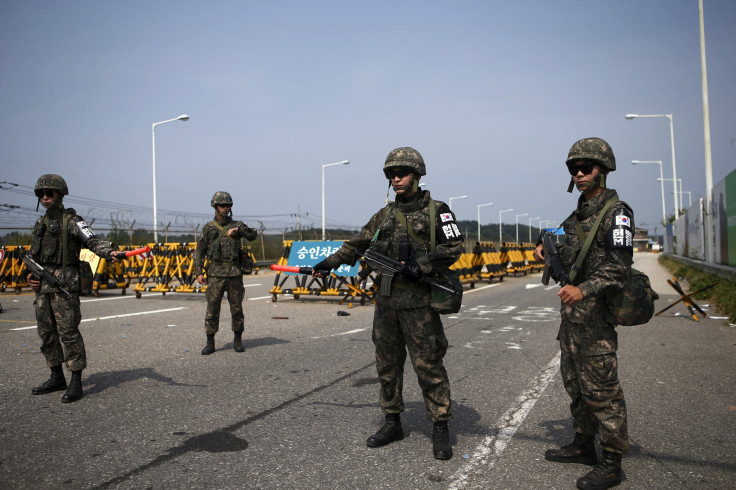South Korean Military Still On Alert Despite Halting Propaganda Broadcasts Near Border With North

South Korea stopped its anti-Pyongyang propaganda broadcasts Tuesday as part of an accord signed with North Korea after more than 30 hours of talks. However, South Korea’s official news agency Yonhap said that Seoul will continue to maintain military readiness near the border until the situation calms and the North pulls back its troops.
The talks began Saturday in the village of Panmunjom in the demilitarized zone (DMZ) amid increased tension between the two rivals. However, the talks ended with North Korea agreeing to end its “quasi state of war” in exchange for Seoul stopping the broadcasts.
South Korea's President Park Geun-hye said, according to the BBC, that the deal "could serve as an occasion to resolve all inter-Korean issues through trust."
South Korea's defense ministry spokesman Kim Min-seok said Tuesday, according to Yonhap: "Since the North has agreed to withdraw the semi-war state starting at 12:00 p.m., our military will maintain its defense posture for the possibility of another provocation."
Kim added that Pyongyang said it may need “considerable” time to withdraw its troops from the front line, and Seoul will push back its alert position in line with the North’s efforts.
Tensions between the two rivals began to escalate after a landmine explosion injured two South Korean soldiers earlier this month in the DMZ.
The annual Ulchi Freedom Guardian military drill in South Korea with the U.S. also led to the North threatening attacks against Seoul and Washington. Last week, the two countries exchanged shelling and Pyongyang threatened to blow up South Korean loudspeakers. While North Korea did not directly apologize for the landmine explosion the country expressed “regret” over the incident.
"I hope the two sides faithfully implement the agreements and build up (mutual) confidence through a dialogue and cooperation and that it serves as a chance to work out new South-North relations," Kim Kwan-jin, chief negotiator for South Korea and director of the presidential national security, said, according to AP.
A report from Yonhap, citing military officials, had said Sunday that during the talks, “seventy percent of North Korea's submarines left their bases, and their locations are not confirmed." It was not determined if they have been pulled back since the agreement was announced.
© Copyright IBTimes 2024. All rights reserved.






















